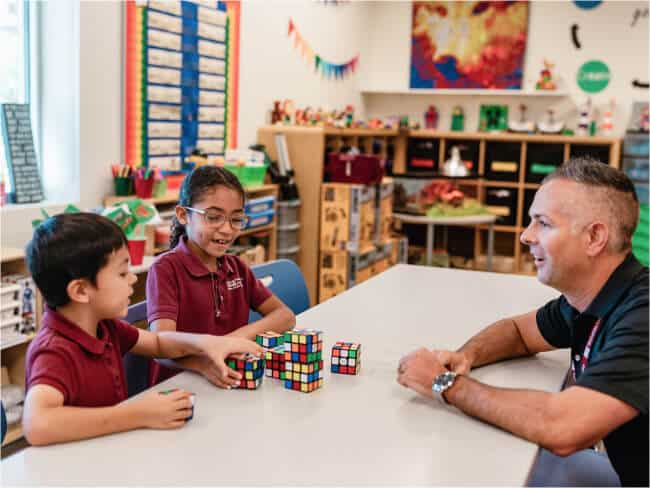One of the most important decisions parents/guardians face in their student’s educational journey is determining the type of school that will best support their future success. This includes whether a college prep program is the right fit.
A prep school is an educational institution designed to rigorously prepare students for higher education. Selecting the right prep school can significantly impact your student’s academic success and future opportunities. According to the National Assessment of Educational Progress (NAEP), students in private (or preparatory) schools consistently outperform their public school peers. In fact, students from prep schools are twice as likely to graduate from college compared to their peers in traditional schools.
This comprehensive guide will help you understand the essentials of prep schools, their benefits, and how to make the best choice for your student’s future.
Understanding the basics of college prep schools

Definition of prep schools
Prep schools, short for preparatory schools, are educational institutions designed to prepare students for higher education, particularly college. Unlike traditional schools, prep schools often offer a more rigorous academic curriculum, smaller class sizes, and a vast array of extracurricular activities aimed at holistic development.
Distinction from other schools
While traditional schools cater to a broad student base and follow state-mandated curriculum, prep schools are often private or independent schools that have the flexibility to design their programs to challenge and engage students more intensively.
Compared to traditional schools, whether public or private, which may also offer enhanced resources and special programs, prep schools specifically focus on college readiness, often incorporating advanced coursework and comprehensive college counseling services.
Prep schools typically have higher academic standards, access to better resources, and faculty who are leaders in their fields. Additionally, the focus is on individualized learning, ensuring each student’s strengths are nurtured and weaknesses addressed.
This tailored approach sets prep schools apart, making them a compelling choice for families seeking a rigorous academic environment that prioritizes college preparation.
Examining the benefits of prep schools

Academic excellence
One of the primary benefits of preparatory academies is the emphasis on academic excellence. They provide a rigorous curriculum that often includes Advanced Placement (AP) courses, International Baccalaureate (IB) programs, and honors classes.
Programs that include personalized college pathways give students the chance to take university courses and earn credits in their major while still in high school, saving them both time and money when they get to college. Unlike AP courses, there is no extra test required to receive credit. And unlike many dual enrollment programs tied to community colleges, the credits are transferable to most colleges and universities.
Individual attention
With smaller class sizes, teachers can provide more personalized attention to each student. This ensures that students receive the support they need to excel academically and personally.
Extracurricular opportunities
Prep schools offer a diverse range of extracurricular activities, including athletics, arts, clubs, and community service. These activities help students develop leadership skills, teamwork, and a well-rounded personality—crucial attributes for both college and career-bound individuals.
Ideal age to start prep school enrollment
Many parents/guardians wonder when to begin their student’s prep school journey. While some schools offer prep programs that start in kindergarten, others start in middle or high school.
It’s generally beneficial to start at an early age, such as elementary school, as it allows children to gradually acclimate to the academic rigor and environment.
A five-year-old is not too young to begin building a foundation for lifelong learning and success. Young students can plan for the future, pursue passions, and develop a vision for the type of student they want to be.
Choosing the right prep school for your student

When researching the best prep schools for your student, it’s essential to consider various factors to ensure a good fit.
Assessing your student’s needs
The first step in choosing a prep school is understanding your student’s needs, strengths, and interests. Consider whether they thrive in a competitive environment or prefer a more collaborative approach. Identify their academic interests, extracurricular passions, and social needs.
Researching schools
Research is crucial when considering enrollment in a college prep or private school. Look into the school’s admission requirements, academic programs, faculty qualifications, extracurricular offerings, and overall reputation. Visiting the school, talking to faculty, and attending information sessions can provide valuable insights.
Financial considerations
Prep schools, which are often private institutions, can be expensive, but many offer financial aid and scholarships to help offset the costs. It’s important to understand the expenses involved and explore all available financial support options.
ASU Prep Digital, an accredited online school program serving students in grades K–12, offers full-time Arizona students tuition-free access to a rigorous college preparatory curriculum. Global Academy at ASU Prep serves students around the world with competitive tuition-based options.
Consider the school’s location and format
When choosing a prep school, consider its location and format. Is it a day school or a boarding school? If it’s a boarding school, how far is it from home, and what are the travel logistics?
Additionally, some schools, like ASU Prep Digital, offer online programs that provide flexibility and access to quality education from anywhere, eliminating the need for travel altogether. These options can be particularly beneficial for families seeking a rigorous academic experience without the constraints of physical location.
The link between prep schools and college success

College counseling
Prep schools often have dedicated academic support and college counseling departments that guide students through the college application process. They help with college selection, application preparation, essay writing, and interview techniques.
Alumni networks
Strong alumni networks can provide valuable connections and opportunities for current students. Many prep school graduates attend prestigious colleges and universities, creating a pathway for future students in college admissions.
Academic preparedness
The rigorous academic training provided by prep schools ensures that students are well-prepared for the challenges of college coursework. They often enter college with advanced standing or college credits, giving them a head start.
As part of Arizona State University, ASU Prep Digital gives students an accelerated path with the opportunity to earn both high school and college credit toward a major. The same acceleration options are available in middle school, where students are encouraged to work ahead and start earning high school credit.
Making the most of your student’s prep school experience

Encouraging participation
Encourage your student to take full advantage of the school’s offerings. Participation in extracurricular activities, clubs, and sports can enhance their college applications and personal growth.
Building relationships
Strong relationships with teachers and counselors can be incredibly beneficial to your student’s academic growth. Encourage your student to seek mentorship and advice from their educators.
Fostering independence
Prep school is an excellent opportunity for your student to develop independence and self-discipline. Support them in taking responsibility for their studies and personal growth.
Staying involved
As a parent/guardian, staying involved in your student’s education will help to build a strong foundation of support. Attend parent-teacher meetings, stay in touch with the school, and support your student’s academic and extracurricular endeavors.
Conclusion
Choosing a prep school is a significant decision that can shape your student’s educational journey and future success. By understanding the basics of prep schools, assessing your student’s needs, and actively participating in their education, you can ensure they thrive in this enriching environment. The right prep school will not only prepare them academically but also nurture their personal growth and pave the way for a successful college pathway.
Explore ASU Prep Digital’s innovative college prep education

ASU Prep Digital is an online school serving students in grades K–12 and school partners around the world. We are a college prep option where online high school and university courses converge in a unique learning opportunity for all students.
This accredited, rigorous virtual school program prepares students for college acceptance and encourages them to start earning credit through Arizona State University toward college majors and careers.
We believe all students can succeed. Our unique teaching model supports students anywhere, anytime with the latest learning technologies and several layers of personalized instruction and coaching.
We support districts in Arizona, while serving students and schools around the world.
Take the first step toward transforming your educational experience by attending an information session. Discover how ASU Prep Digital can support students’ academic aspirations and set them on a path to success.
What are prep schools? The complete parent’s guide: FAQs
What is a prep school?
A prep school, or preparatory school, is an educational institution that prepares students for higher education. These schools often have rigorous academic programs and offer resources and opportunities to help students excel in their chosen fields of study.
How effective are college preparatory schools?
College preparatory schools have been shown to significantly increase students’ chances of getting into and succeeding at top universities. These schools provide a highly focused and intellectually challenging curriculum, as well as individualized support and coaching for students to help them reach their academic goals. Additionally, college preparatory schools often have strong relationships with colleges and universities, providing students with better opportunities for admission and financial aid. Overall, attending a college preparatory school can greatly benefit a student’s academic aspirations and future success.
What are the typical requirements for prep schools?
The requirements for prep schools vary depending on the specific school and its admissions process. However, some common requirements may include a strong academic record, letters of recommendation, standardized test scores, an application essay, and possibly an interview. Some prep schools may also have additional criteria such as extracurricular activities or community service involvement. It is important for students to research and understand the specific requirements for each school they are interested in applying to.
What are the benefits of prep school?
There are many potential benefits of attending a prep school, including rigorous academic programs, smaller class sizes, access to resources and opportunities, and a supportive community. Prep schools often have highly qualified teachers who are dedicated to helping students succeed academically. They may also offer advanced courses or specialized programs that can better prepare students for college or specific career paths.

